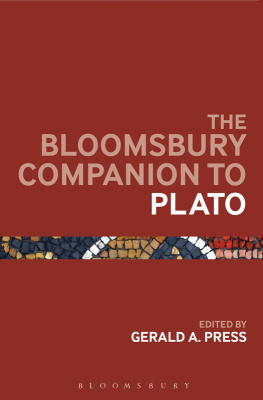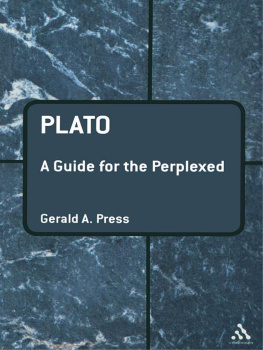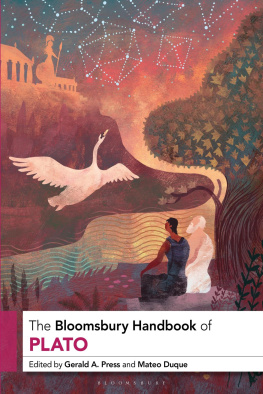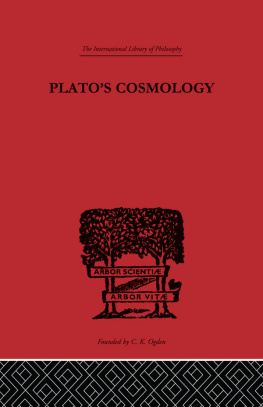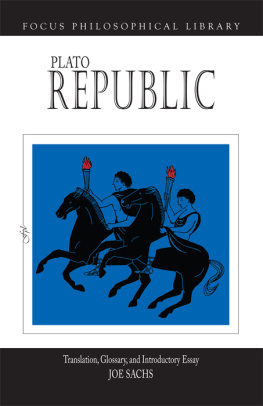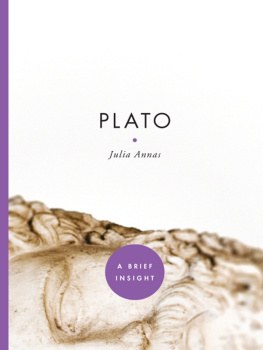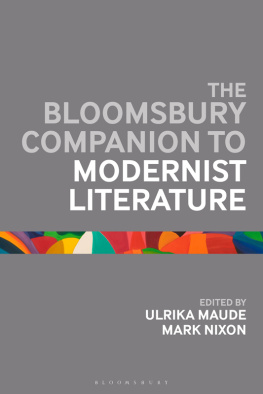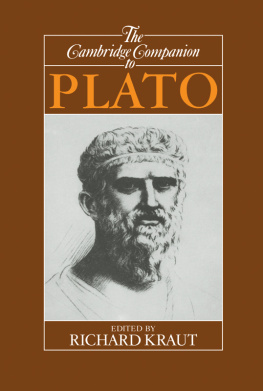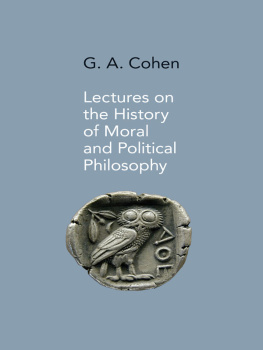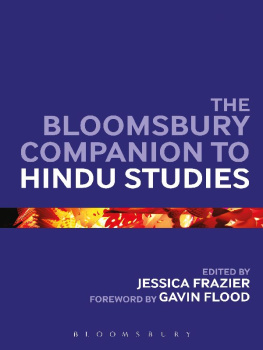The Bloomsbury Companion to Plato
Bloomsbury Companions
The Bloomsbury Companions series is a major series of single volume companions to key research fields in the humanities aimed at postgraduate students, scholars and libraries. Each companion offers a comprehensive reference resource giving an overview of key topics, research areas, new directions and a manageable guide to beginning or developing research in the field. A distinctive feature of the series is that each companion provides practical guidance on advanced study and research in the field, including research methods and subject-specific resources.
Titles currently available in the series:
Aesthetics, edited by Anna Christina Ribeiro
Analytic Philosophy, edited by Barry Dainton and Howard Robinson
Aristotle, edited by Claudia Baracchi
Continental Philosophy, edited by John Mullarkey and Beth Lord
Epistemology, edited by Andrew Cullison
Ethics, edited by Christian Miller
Existentialism, edited by Jack Reynolds, Felicity Joseph and Ashley Woodward
Hegel, edited by Allegra de Laurentiis and Jeffrey Edwards
Heidegger, edited by Francois Raffoul and Eric Sean Nelson
Hobbes, edited by S.A. Lloyd
Hume, edited by Alan Bailey and Dan OBrien
Kant, edited by Gary Banham, Dennis Schulting and Nigel Hems
Leibniz, edited by Brendan Look
Locke, edited by S.-J. Savonious-Wroth, Paul Schuurman and Jonathan Walmsley
Metaphysics, edited by Neil A. Manson and Robert W. Barnard
Philosophy of Language, edited by Manuel Garca-Carpintero and Max Klbel
Philosophy of Mind, edited by James Garvey
Philosophy of Science, edited by Steven French and Juha Saatsi
Political Philosophy, edited by Andrew Fiala
Pragmatism, edited by Sami Pihlstrm
Socrates, edited by John Bussanich and Nicholas D. Smith
Spinoza, edited by Wiep van Bunge
THE BLOOMSBURY
COMPANION TO PLATO
EDITED BY
Gerald A. Press
Associate Editors: Francisco Gonzalez, Debra Nails and Harold Tarrant
Bloomsbury Companions
Bloomsbury Academic
An imprint of Bloomsbury Publishing Plc

CONTENTS
The editor would like to thank the publisher for supporting this project, as well as several members of the staff who assisted in it over the years: Evander Lomke, Sarah Campbell and Tom Crick. I especially appreciate the ongoing help and advice Merilyn Holme has provided over several years.
I am grateful to the President, Provost and Dean of Hunter College for a sabbatical in 200910 that gave me the extra time I required for organizing, managing and writing the project. I want to thank the Research Foundation of the City University of New York for a PSC-CUNY Research Grant that enabled me to hire an Editorial Assistant to edit contributions as they were received. My thanks goes to Elvira Basevich, the Editorial Assistant, for her dedicated and painstaking work in editing individual contributions and compiling the Bibliography. Thanks also to Gregory Smulewicz-Zucker for compiling and editing the List of Contributors and John Storm for editorial advice on several of the articles and the Introduction.
I would like to thank each of the contributors for their work on this project and their willingness to adapt their articles to the overall plan and needs of the volume and to say in fewer words than they often wished what might have been said in more. Special thanks to Sarah Hutton and Samuel Scolnicov for advice at moments of special need.
Most of all, I want to thank the Associate Editors of this volume, Francisco Gonzalez, Debra Nails and Harold Tarrant, for their collaborative hard work over the 3 years of working on the project in defining the contents, selecting the contributors, editing the submissions and providing specific advice and suggestions in instances too numerous to count. They have been examples throughout of the intellectual moderation, courage, wisdom and justice that make the scholarly life happiest and best.
In this work, after the first mention of a Platonic dialogue or other Platonic work, the following abbreviations are used:
Alcibiades (Alc. I, 2)
Amatores (Amat.)
Apology (Ap.)
Axiochus (Ax.)
Charmides (Chrm.)
Clitophon (Clit.)
Cratylus (Cra.)
Critias (Criti.)
Crito (Cri.)
Definitions (Def.)
Demodocus (Demod.)
Epigrams (Epigr.)
Epinomis (Epin.)
Epistles (Ep. I, 2, etc.)
Eryxias (Erx.)
Euthydemus (Euthd.)
Euthyphro (Euthphr.)
Gorgias (Grg.)
Halcyon (Hal.)
Hipparchus (Hipparch.)
Hippias Major (Hp. Ma.)
Hippias Minor (Hp. Mi.)
Ion
Laches (La.)
Laws/Leges (Lg.)
Lysis (Ly.)
Menexenus (Mx.)
Meno (Men.)
Minos (Min.)
On Justice (Just.)
On Virtue (Virt.)
Parmenides (Prm.)
Phaedo (Phd.)
Phaedrus (Phdr.)
Philebus (Phlb.)
Protagoras (Prt.)
Republic (R.)
Sisyphus (Sis.)
Sophist (Sph.)
Statesman/Politicus (Plt.)
Symposium (Smp.)
Theaetetus (Tht.)
Theages (Thg.)
Timaeus (Ti.)
DK Diels-Kranz, Hermann Diels and Walther Kranz. Die Fragmente der Vorsokratiker.
This is a standard source for fragments of the pre-Socratic philosophers. A numbers refer to testimonies about the philosopher; B numbers refer to fragments of their actual words.
D. L. Diogenes Laertius. Lives and Opinions of Eminent Philosophers.
This is a third-century CE doxography that is an important source of the views of ancient philosophers.
Antid. | (Antidosis) |
b. | (born) |
bk | (book) |
bks | (books) |
c. | (circa) |
cf. | (confer, compare) |
ch. | (chapter) |
chs | (chapters) |
d. | (died) |
ed. | (editor/edited by) |
edn | (edition) |
eds | (editors) |
f. | (fragment) |
ff. | (fragments) |
fl. | (floruit) |
Il. | (Homer, Iliad) |
no. | (number) |
nos. | (numbers) |
n.s. |
Next page
